
The accumulated global evidence suggests that supervised injecting facilities play a significant role in preventing drug-related deaths and associated harm. Evidence shows how supervised injecting facilities can address health and social challenges associated with drug dependence, benefiting both individuals and communities at large. Evidence presented in this document demonstrates a clear need for a new facility in Melbourne's CBD.

The Burnet Institute surveyed a sample of people who inject drugs recruited from needle and syringe programs across metropolitan Melbourne to explore COVID-19 vaccine acceptability. This bulletin presents preliminary findings describing the responses to these questions.

Burnet Institute has been commissioned to investigate whether a medically-supervised safe injecting facility, which could include a drug testing service, should be established in Canberra.

Burnet Institute welcomes the addition of a new nasal spray form of naloxone, the life-saving medicine capable of reversing the effects of opioid overdose, to the Pharmaceutical Benefits Scheme (PBS) from November 1.
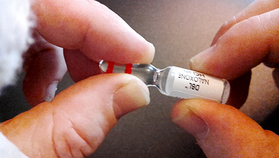
Burnet Institute research into the anti-opioid medication naloxone will benefit from $100,000 in Federal Government funding announced today.
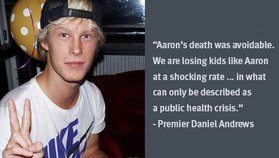
Saving lives and SIF: Aaron's story

CREIDU's Paul Dietze, alongside Robyn Dwyer and Suzanne Fraser, has recently published the above study in Drugs: Education, Prevention and Policy

News article by Tracy Parish -- Burnet Institute Deputy Head of Public Affairs & Communications & CREIDU Executive Committee member

Medical Journal of Australia Perspectives article written by members of the Naloxone National Reference Group (NNRG)

New cure treatments for hepatitis C will now be available for every Australian living with the disease thanks to a landmark Federal Government decision.

Article from The Conversation written by Simon Lenton and Paul Dietze.

Health professionals, community groups, academics and policy makers can now access latest, evidence-based recommendations on the management of hepatitis c among people who inject drugs.
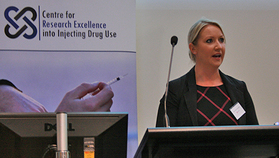
A diverse range of speakers from Scotland, England, NSW and Victoria shared their insights at this year’s CREIDU Colloquium centred on Prisons: Opportunities and challenges towards improving the health of people who inject drugs.

Interim ruling indicates overdose reversal drug naloxone may be down-scheduled to Schedule 3.

The Australian Capital Territory’s innovative opioid overdose management program, which makes take-home naloxone available to potential opioid overdose victims, has been overwhelmingly endorsed by an independent evaluation.

A number of full and partial scholarships have been announced for the 4th International Symposium on Hepatitis Care in Substance Users Conference, Sydney, October 7-9 2015.

Growth in the number of people receiving pharmacotherapy treatment for opioid dependence has slowed, according to new information published today on the Australian Institute of Health and Welfare (AIHW) website.

The World Health Organisation has released guidelines for the prevention, care and treatment of persons living with chronic hepatitis B infection. These guidelines complement similar recently published guidance by WHO on the prevention, care and treatment of infection due to the hepatitis C virus.

Registration and abstract submission is now open for The 4th International Symposium on Hepatitis Care in Substance Users (INHSU). This symposium is the leading international conference focused on the management of hepatitis among substance users.

A parliamentary health committee has announced an inquiry into treatment, testing, prevention and the cost of hepatitis C in Australia.

Associate Professor Mark Stoové presented the keynote address at the Living Victoria/Burnet Institute World AIDS Day 2014 celebration.

The TAP Study will investigate the efficacy and feasibility of treating people who inject drugs with hepatitis C virus in community-based settings with a 12-week course of oral therapy of sofosbuvir and ledipasvir.

The World Health Organization, based in Geneva, has launched its first-ever Guidelines on the Community Management of Opioid Overdose in a bid to prevent needless drug-related deaths.

CREIDU PhD candidate Tania Patrao was recently awarded an APA scholarship, which are awarded to students of exceptional research potential.

The Centre for Research Excellence into Injecting Drug Use (CREIDU) hosted a panel discussion at AIDS 2014 focusing on controversies in treatment as prevention in people who inject drugs.

The elimination of hepatitis C is a real possibility with new treatments combined with harm reduction, according to World Health Organization experts, including Burnet Institute’s Professor Margaret Hellard.

Article discussing the HIV response in three key communities, including people who inject drugs.

HIV and hepatitis C (HCV) treatment as prevention in people who inject drugs was the focus of today’s Centre for Research Excellence into Injecting Drug Use (CREIDU) Colloquium, ahead of AIDS 2014.

Outline abstracts (300 word maximum) are invited for contributions to a forthcoming special issue of The International Journal of Drug Policy on expanding access to care and treatment for hepatitis C virus infection among people who inject drugs.

The Council of Australian Governments Health Council endorsed five new national strategies for blood-borne viruses and sexually transmissible infections in June 2014.

The Therapeutic Goods Administration (TGA) has approved Sovaldi® (sofosbuvir), a new direct acting antiviral treatment, for the treatment of chronic hepatitis C infection.

The World drug report 2014 recommends a stronger focus on health needs and human rights of all people who use drugs.

View and sign the declaration to affirm that non-discrimination is fundamental to an evidence-based, rights-based and gender transformative response to HIV.

The Yarra City Council has reviewed the recommended actions from this report and taken action across all thirteen recommendations.

Applications due Friday 30 May, 2014.

The Australasian Society for HIV Medicine (ASHM) is once again offering its Junior Researcher Support Awards to junior researchers in the fields of HIV, viral hepatitis and STIs.

A community consultation period is open until 11 June 2014 for the drugs Simeprevir and Sofosbuvir. This provides an opportunity for anyone to make their voice heard about these drugs being considered for government subsidy through the Pharmaceutical Benefits Scheme (PBS).

Small cash incentives can dramatically increase the likelihood of people who inject drugs completing a course of hepatitis B virus (HBV) vaccination, according to new research led by King’s College London.

The Australian Society for HIV Medicine (ASHM) have announced a new domestic scholarship program for the 20th International AIDS Conference to be held in Melbourne, July 20-25 2014.

The Australian Government is investing $22.45 million over four years for prevention programmes to help address increasing rates of sexual transmissible infections (STIs) and blood borne viruses including HIV, hepatitis B and hepatitis C.

The World Health Organization has issued its first guidance for the treatment of hepatitis C, a chronic infection that affects an estimated 130 million to 150 million people and results in 350 000 to 500 000 deaths a year.

A heroin overdose-reversal drug system called Evzio has been approved by the FDA.

Health experts are calling for rapid testing to be extended to people at risk of having hepatitis.

Tessie Castillo examines and debunks seven persistent myths surrounding naloxone.

CREIDU's Margaret Hellard writes about new hepatitis C treatments, treatment as prevention and barriers associated with eliminating hepatitis C.

South Australian researchers claim they have made a significant breakthrough in tackling HIV and hepatitis C, using a new type of DNA vaccine which protects against the viruses and could possibly provide a cure in five years.

Follow CREIDU on Twitter for updates, news and events.

Sharon Lewin discusses the 2014 International AIDS Conference.

The StepWise team are excited to announce the launch of a new area of the online StepWise Guide designed specifically for young people interested in and planning to attend AIDS 2014.

In his keynote speech, Peter Piot called on the AIDS movement to take a cold, hard look at the lessons learned, and counter what he sees as the dangerous myths that could lead to a collective state of denial.

Several lives have been saved through a project training illicit drug users to reverse overdoses through naloxone injections worth just $40.

Syringe dispensers planned for Braybrook, Footscray

GAY and bisexual teen boys in the US use illicit steroids at a rate almost six times higher than do straight kids, researchers say.

Drug Policy Alliance Harm Reduction Manager Meghan Ralston discusses the death of Philip Seymour Hoffman and acknowledges the need to improve drug policies
Heroin users do not simply "grow out" of their drug addiction, experts say, with more people like US actor Philip Seymour Hoffman using the drug in their 40s and 50s - and dying from overdose.

Data from the ACC’s 2011-12 Illicit Drug Data report indicated that the market for performance and image enhancing drugs (PIEDs) has expanded, with record numbers of seizures, detections and arrests.

Syringe vending machines have been used in New South Wales since 1992 and are also being used in Queensland, the ACT, Western Australia and Tasmania.
A petition has been launched requesting that the Australian Government reconsider its decision to stop funding ADCA. To show your support sign up at http://chn.ge/1k00opp.
Acknowledging the impact drug overdose has on individuals, their families and the community.
A study recently published by researchers at the Kirby Institute, University of New South Wales, including CREIDU's Professor Lisa Maher, shows that the decline in HCV incidence among Australian injecting drug users coincides with the expansion of harm reduction programs
Planning is underway to develop a strategy to distribute naloxone, the overdose reversal drug, in the inner-city suburbs of Collingwood, Richmond and Fitzroy.
CREIDU's Associate Professor Stuart Kinner from the University of Melbourne is interviewed on ABC News Radio about his study which looked at the mortality of people after being released from prison.
World Hepatitis Day is an annual event that each year provides international focus for patient groups and people living with hepatitis B and C.
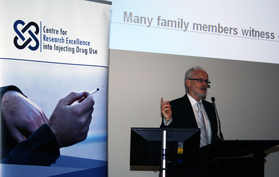
Key experts from Australia and UK discuss making naloxone available to those who potentially will witness overdose.
The first-ever international guidelines for treating hepatitis C in people who inject drugs have been published in the journal Clinical Infectious Diseases ahead of World Hepatitis Day on 28 July.
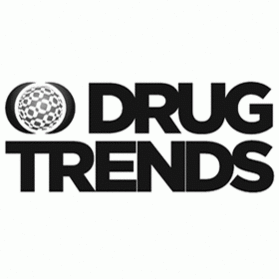
‘Drugs, crime and the front-line: Australasian perspective’
CREIDU congratulates Professor Lisa Maher as this year’s recipient of the National Drug and Alcohol Award’s Prime Minister’s Award for Excellence.
New research undertaken on the streets of Richmond and Abbotsford has revealed increasing health risks for people who inject drugs and significant community concern over the impact of injecting in public areas.
Scientists show potential impact of therapy in reducing hepatitis C transmission in UK, Canada and Australia.
CREIDU PhD scholar Danielle Horyniak's research entitled "The relationship between age and risky injecting behaviours among a sample of Australian people who inject drugs" published in the Drug and Alcohol Dependence journal this month shows that older injecting drug users report significantly lower levels of high-risk injecting practices.
Fatal overdoses associated with heroin and other opioids continue to rise. CREIDU's Trevor King writes in the Hep Review magazine about naloxone as an important overdose prevention and management strategy, and the need to expand the availability of naloxone to trained peers and family. (Also see our Policy Brief on improving responses to opioid overdose through naloxone).
CREIDU welcomes the announcement by Minister for Health Tanya Plibersek that two new hepatitis C treatments, boceprevir and telaprevir will be listed on the Pharmaceutical Benefits Scheme (PBS).
This workshop, as part of the Medicine in Addiction 2013 conference will provide an update on hepatitis C patient assessment and monitoring among professionals working in primary care.
CREIDU's Trevor King writes in this month's Hep Review magazine, highlighting the need for urgent evidence-based policy responses to the stigma and health and social issues faced by people who inject drugs.
CREIDU welcomes the development of Australia’s first HBV testing policy and the identification of PWID as a priority group for testing and vaccination.
Viral hepatitis is an urgent health concern. Immediate action is needed to prevent new infections and to tackle the rising burden of cirrhosis and avoidable deaths due to liver cancer.